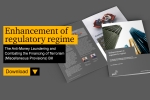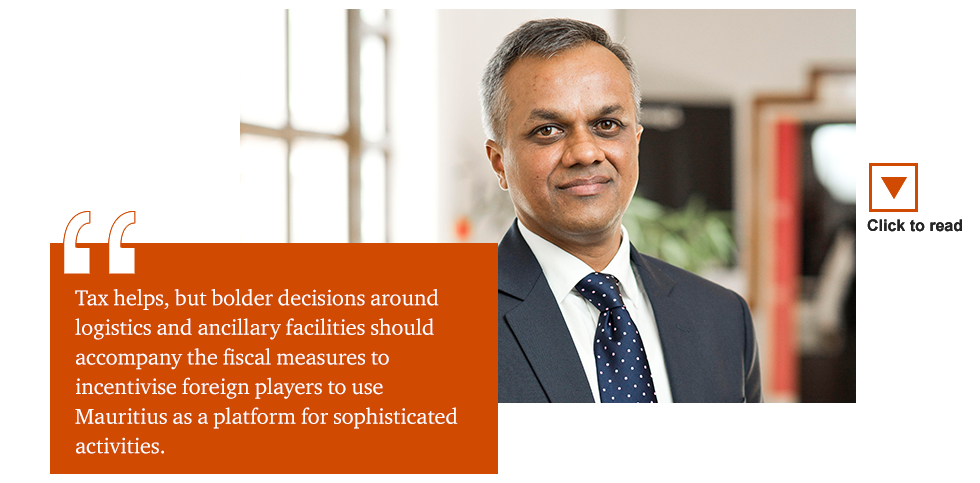The Budget 2019-20 (“the Budget”) lays the foundation for a brighter future, with as objective to make Mauritius a high-income country, a more inclusive and innovative nation, where development is sustainable. Among others, the Hon. Minister of Finance announced measures such as strengthening the economic pillars, expanding economic space, promoting a safer and more secure living environment to achieve the above aim.
Tax measures
There will be tax holiday of four (4) years for companies on income derived from bunkering of low Sulphur Heavy Fuel Oil. We saw the introduction of similar tax exemptions in the past to develop Mauritius as a Petroleum Hub.It remains questionable whether these few exemptions are sufficient for Mauritius have its footprint in the industry. Tax helps, but bolder decisions around logistics and ancillary facilities should accompany the fiscal measures to incentivise foreign players to use Mauritius as a platform for sophisticated activities.
Last year, we also saw major tax reforms in the Global Business Sector prompted by pressure from international bodies such as the OECD and the EU. The effects of such reforms are yet to be seen, but it is encouraging to see that there are measures in this Budget aiming to revamp Mauritius as an International Financial Centre. Special tax regimes to promote the development of Real Estate Investment Trusts, wealth management activities or a scheme for headquartering e-commerce activities are welcome. Past budgets did not produce the desired results; will these fiscal incentives in isolation suffice?
Income derived by banks from Global Business Companies will not be subject to special levy. This was an awaited measure to ensure parity with the previous tax regime on the special levy for Banks. Further, the income of banks derived from SMEs in Mauritius (such as enterprises engaged in agriculture, manufacturing or the production of renewable energy) and from operators in African or Asian countries will be taxed at a reduced rate of 5%. This will no doubt encourage banks support enterprises in the relevant sectors.
The Minister also announced a few measures that aim to promote Mauritius as a greener economy: the excise duty on non-fossil outboard motors will be abolished; individual taxpayers will be able to deduct the total investment on the acquisition of a fast charger for an electric car, while corporates can claim twice the amount from their taxable income. In addition, hotels will be allowed a deduction of 150% of the expenses incurred on cleaning, renovation and embellishment works in public realm.
Tax Administration
Further improvement in the Tax Administration is also one of the focus of the present government. In the past years, we saw the introduction of the Expeditious Dispute Resolution and Alternative Tax Dispute Resolution panels, and these have been quite successful. Around 194 cases were resolved with a tax yield of Rs500m, and enlarging the scope of these panels to cover the Environmental Protection Fee and Duties and Custom laws is a welcomed initiative.
The Assessment Review Committee (ARC) was initially set up to ease proceedings on tax disputes. However, the filing requirements of the ARC are quite demanding, it has become a challenge and a financial burden for taxpayers (e.g. the filing of a Witness Statement and Statement of Case) when making representations. Although taxpayers will now have more time to file the documents, will that really relieve them?
The Voluntary Disclosure of Income Scheme has been re-introduced, and will cover SMEs and taxpayers holding foreign assets. There will be a complete waiver of the applicable penalty and interest on any undeclared income. We hope that the waiver of the interest and penalties will be extended to genuine and compliant taxpayers who are under tax investigations by the tax authorities.
Conclusion
This Budget has introduced a few notable measures that will improve tax administration and tax collections. Dispute resolutions at the Objection and ARC levels have improved but it is becoming critical that we find settlements for the 3,509 pending cases with a tax value of Rs15bn. More importantly, with the ever-changing tax environment, Mauritius will have to revisit continuously its model; unless we take bolder decisions, it will be a challenge for Mauritius to sustain as a robust financial sector.
Contact us

Anthony Leung Shing, ACA, CTA
EMA Deputy Regional Senior Partner, Country Senior Partner, PwC Mauritius
Tel: +230 404 5071














